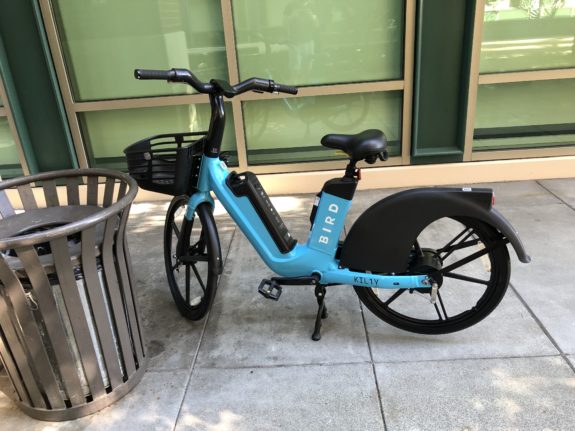
Scooter share company Bird has quietly launched new shared e-bikes in Seattle in addition to their fleet of scooters, so of course I had to hunt one down and take it for a ride.
The company’s pedal-assist e-bikes are the first direct competitor to Lime since Lime took over JUMP in 2020. Veo also has “bikes” in operation in Seattle, but they are more like throttle-controlled scooters with mostly useless pedals. Bird’s bikes, which the company first introduced in 2021, are much more like the now-familiar Lime bikes. They cost $1 to unlock plus 39¢ per minute, which is 8¢ less per minute than Lime’s bikes as of press time. Note that the companies adjust these prices often.
After a few tries, I was able to ride a fully-functional bike, and it was great. It passed my downtown hill-climbing test, getting up and down the extremely steep blocks of Spring and Seneca Streets between 2nd and 4th Avenues. A bike that can handle these hills can handle any Seattle bike route.
The blue and black bikes have solid tires similar to those common on early private bike share bikes launched in Seattle back in 2017. These solid tires have the obvious benefit of reliability because they cannot go flat, but they do make the ride a bit bumpier than the more familiar tires filled with air that the Lime bikes use. The Bird bikes also have somewhat sluggish brakes, but they are good enough to stop the bike on a very steep downhill. The saddle height is adjustable using a dropper post handle, which is very easy, fast and intuitive.
Overall, the Bird bike is not quite as good as the Lime bike, which had the benefit of consuming JUMP’s many years of bike development. But the Bird bike is cheaper to ride, so the better Lime ride comes with a price premium. 8¢ per minute doesn’t sound like a lot of a price difference, but it adds up. If you ride for 30 minutes, the price difference is $2.40, about the cost of a transit fare. It will be interesting to see if Lime is forced to stop its ongoing price hikes now that they have a direct competitor.
When I headed out to ride one Friday, there were only a handful Bird Bikes in the whole city. The first one I found was not on the app, and it quickly became clear why: The battery was missing. Not a great start. A found another bike a few blocks away, and it did have a battery. But riding it was not a great experience. I’m not sure if it was a problem with the bike or if the company was instituting the same 8 mph limit that is required for first-time scooter rides, but the bike seemed to actively resist trying to pedal past 8 mph or so. If I stopped pedaling, the motor would turn off and roll freely, but if I tried to pedal, it felt like it was putting on the brakes. I tried ending the trip and then restarting it, but the same thing happened.
I wanted to test if this was an isolated problem with that bike, so after quite a bit more Bird hunting I was able to find another one (GPS locations in the app were quite a bit off in downtown, showing bikes a block away from their actual locations). This bike worked perfectly. As one would expect, the motor would assist riding up to 15 mph, and it did not resist pedaling like the first bike I rode did.
The true test will be reliability over time. The fact that I had a tough time finding a working bike when there were only a few on the streets did not inspire confidence. But hopefully that was just teething pains related to launching a new service. It’s great to have more bikes on the streets, rekindling bike share competition for the first time in years.






